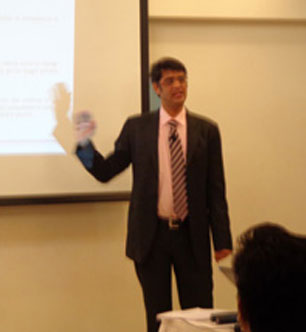One-on-One Coaching

A typical one-on-one coaching engagement would be about a year, and often more than a year depending on the results that the coachee would like to achieve. Sometimes coachees need support for a shorter while, and we can design a 6-month engagement.
All coaching is results-based.
Coaching programs are customized, and here is an example ofa structure created for one of my clients:
- An initial in-depth face-to-face session (typically 3 hours) to clarify areas that matter, and commitments within each area. This is an important session that sets the future conversations
- Interactions with stakeholders (about 3 – 5 people)
- 90-Minute conversations every two weeks
- Face-to-face meeting at least once every 3 months
- Feedback from stakeholders – twice during the course of the year
- 2 -3 ‘shadowing’ sessions; followed by debrief
- Open access during the course of the year for taking care of important and urgent matters
- Written feedback and recommended practices – 3 months into the relationship
- Closing session, and commitments for continual learning.

Team Coaching
In the recent years, team coaching has gained importance as one important way to bring the team together and apply principles of coaching to the entire team. What is important to note is that a team is constituted in a promise, and there are several constitutive team conversations that each team must have to achieve success. Without these critical conversations, a team is just a group of people hanging out together.
All team coaching is results based.
Team coaching programs are customized, and here is an example of a structure created for one of my clients:
- An initial interaction with the team leader
- Initial interaction with the Customer of the team (generally the person the team leader reports to)
- Initial interaction with individual team members to understand their concerns.
- After individual meetings, once I have an idea of all their concerns, a group meeting with the team to agree upon the coaching areas for the team.
- 90-minute team conversations every two weeks
- Face-to-face team coaching at least once every 3 months
- Feedback from stakeholders – twice during the course of the year
- Attend one team meeting as an observer every quarter; followed by debrief
- Open access during the course of the year for taking care of important and urgent matters
- Written feedback and recommended practices – 3 months into the relationship
- Closing session, and commitments for continual learning.
In addition to the key measurable result that we focus on during our engagement together, some other qualitative outcomes you can expect from Team Coaching are:
- Greater trust
- Better collaboration
- Improved accountability and ownership
- Stronger team relationships
- Improved engagement




